- Home
- Barry Unsworth
The Hide Page 15
The Hide Read online
Page 15
‘You’re talking about this horse he gave you,’ Mr Cade said. ‘If I’m not mistaken.’
‘Oh, you know about that do you? You told your friend about the horse then, Josiah?’
‘He tells me everything,’ Mr Cade said. He was looking at me now and I realised at this moment that if he knew Josiah had given Audrey the horse, he must know that I had suggested it in the first place. It was a very painful moment for me. He said nothing more, however, and after a moment or two, Audrey went on: ‘I hope you will help him too, as far as you can. I know how much he listens to you. . . .’ She was speaking now with an obvious attempt at appeasement. Mr Cade’s knowledge must have come as a shock to her too. ‘I myself,’ she said, ‘am prepared to give him every assistance and I think that, under my guidance of course, he could develop and broaden his talent, I am hoping that he will get enough work together to hold an exhibition. I have important friends in the district. . . .’
Mr Cade at this point threw back his head and with a quite extraordinarily malevolent expression, between a smile and a sneer, said, ‘A spot of private patronising, such as occurred in the Renaissance.’
Before I could decide whether this was a genuine mistake, or a subtle way of rebuking Audrey’s pretentiousness, Josiah started speaking and with such eagerness that it was clear that only pride in his friend had kept him silent so long: ‘That is him all over, using all them kind a words, he has a tremendous vocabulary, well you would want a dictionary to keep up with him, you should hear him sometimes on the stall. . . .’ He looked from face to face as he was speaking, with great concentration, reminding me of a dog that Howard used to keep, a spaniel named Phoebe, which used to scan our faces with similar intensity wherever there was some prospect of being taken for a walk. Josiah wanted to see, on Audrey’s face and mine, our sense of the marvellousness of Mr Cade. What he saw on mine I don’t know; he saw on my sister’s a depreciating smile, an acid thinning of the lips. Mr Cade’s sneering tone and Josiah’s open admiration of him had overtaxed her conciliatory powers, always rather meagre. ‘Well-educated people,’ she said, ‘express themselves as simply as possible, Josiah, they try to communicate, not just to impress. And in that way they avoid mistakes. Mr Cade must mean patronage.’
It was obvious that the gardener failed to understand her words, only the critical, disparaging intention. He must have understood, however, in that moment that the visit was not being a success. His face lost its animation, he glanced quickly and almost furtively at his friend, as though wanting to take a line from him, some clue as to how to behave. It suddenly struck me as quite unbelievable that four persons such as we were could be assembled on a ţerrace on a summer afternoon. ‘Well,’ I said, ‘if you’ll excuse me,’ smiling and nodding, putting my hands on my thighs preparatory to getting up. But Cade abruptly stood up before I could do so. ‘I have to be going now myself,’ he stated.
‘Oh, must you?’ Audrey said.
He ignored this. Standing, he looked very tall. In his dark grey suit, with his large, rather clumsy face, his stiffness of bearing, he looked strangely like a man in plain clothes off duty, a prison warder perhaps or an orderly in a mental hospital—he looked quite capable of managing the difficult ones, holding them frothing indefinitely in a half-Nelson. He moved deliberately and with a complete absence of grace or flexibility. It was difficult to imagine him taking part in any games or sports or indulging in any physical frolicking whatever. There was something both absurd and sinister about him. His movement took him slightly in front of me and half turned away, and I was immediately troubled by a vague sense of recognition of something previously seen or dreamed.
He nodded briefly to me and then to Audrey, said ‘Thank you very much Mrs Wilcox,’ then he and Josiah crossed the terrace side by side, one ponderous and unswerving, his large head held firmly erect, the other narrow-hipped and lithe, taking quick short steps. They were like mastiff and whippet.
I glanced at Audrey. With slightly compressed lips she was watching them leave together, and only later did it occur to me that she was consciously at that moment witnessing her own defeat, to be seen simply in the naturalness and apparent inevitability of their two forms together as they walked away. I did not understand this at the time, did not sense the terrible importance that all this had assumed for Audrey.
No, whatever signs there were in her face I failed to notice them because in the few moments before the two of them were lost to sight I had finally identified the thing that had been puzzling me. That set of the head, that tank-like forward motion—I knew now when I had seen it before: that was the figure in the distance, the figure I had seen receding down the road that afternoon when I heard the gate closing, when I had seen the gardener returning down the drive with a white, sick face.
Fosh . . .
MORTIMER SAYS THAT all Mrs Wilcox is interested in is my male member. His own words. She is missing the chopper, he says, since her old man snuffed it, anyone but you would see that a mile off. There is the art books, I tell him, that she is always showing me, and she says she will arrange an exhibition, you heard her say that yourself. I know what sort of exhibition she is thinking of, he said. She took a big interest in me, I said, since I gave her that horse. A course I know what he means, I wasn’t born yesterday, but in my opinion Mrs Wilcox is genuinely interested in artistic things, as usual I didn’t get no chance to explain this to Mortimer because he does not like her. That is all a pretext, he said. Do you really think, he said, that she is interested in the pilgrim soul in you and the sorrows of your changing face? Define your terms, I said to him, but he took no notice. She is only after the one thing, he said, before her fanny dries up altogether, but she doesn’t like to admit it because she is old enough to be your mother and because you are just a scrubber, in her eyes though not in mine, so she goes on about art to conceal her motivations. (I am giving you his own words now.)
A course, Mortimer doesn’t like her. He never liked her before, even before that time he come for tea and she started laying the law down. Right from the time she asked me how old I was he never liked her. And the way she spoke when she caught me with Marion that time, Mortimer thought it was overbearing, that was the word he used. He come back to that topic next time I seen him. Me, I seen nothing wrong in it, she was paying me for my time. But Mortimer saw it different. She wasn’t hiring your male member, he said, though I have no doubt whatsoever that she’d like to. You are taking it for granted, he said, that she has the right to tell you where to sow your oats. When you say nothing wrong you mean nothing to conflict and obstruct their hypocritical bourgeoisie outlook, that is what you mean, Josiah. Don’t you know, he said, that in this day and age all authority is being questioned? It was the same when you were working on the stall, letting old Mrs Morris order you about, do you want to be just one of the exploited masses? I have told you time and time again. In this day and age, people taking no notice of the Archbishop of Canterbury and all the Royal Dukes, let alone Mrs Wilcox, rebellion leaping out all over the place and you go round as if it was still the feudalism era.
Well, when he put it like that I could see it. I certainly did not want to be just one of the typical exploited masses, specially since I could see from the expression on Mortimer’s face that he personally didn’t have no time for them. Besides, he said, that was sexual jealousy. He knew she had come and apologised like, because I told him.
On the Thursday it was, just when I was finishing. Could I speak to you for a few minutes in the house? she said. We went into the same room we went before, but there wasn’t no art books this time. I want to apologise to you, she said, as soon as we got in there. The way I spoke to you on Saturday, she said. It was quite unpardonable. She was talking as if she was out of breath, breathing in like at the same time, so the words seemed to go back into her, and straightaway I got this feeling that I always get these days when I am talking to her, that it wasn’t real, as if these words belonged to a different occasion, or to so
me other people. That’s all right, I said. I should of been getting on with the job.
No, she said, I don’t mean in that way. She had lipstick on, that same bright red kind which is not good for her because she hasn’t got much colour in her face like. And big green earrings. Her eyes are the nicest thing about her, long and narrow and sort of greenish-blue. She was wearing a white blouse that was styled like a man’s shirt but with short sleeves. The insides of her arms was dead white, with the veins showing. I don’t mean in that way, she said. Won’t you have a seat? She pointed to the sofa. Perhaps you’d like a sherry, she said. She poured it out in the same kind of glasses—I never drank out of glasses like them before or since. Then she come and sat down beside me on the sofa. I don’t mean as your employer, she said. I like to think that now a different kind of relationship has been established between us. The smell of sherry come off her in waves and that was before she even put this glass to her mouth like. She must have been on it all the afternoon. We have come to know each other well, in the course of these past weeks, she said. Don’t you think so? Yes, I said. Yes, I do. She moved about a bit on the sofa beside me. Well, she said, it is as a friend . . . Although we are of different stations, she said. In the eyes of the world I mean. . . . She turned her face to look at me, I could see the lipstick shining on her mouth, and them eyes of hers looking at me very close, so close I had to look back into them and it was then I got a nasty shock because I wasn’t there at all. What I mean is, she wasn’t looking at me at all and this really give me the creeps because it reminded me of that bloke in the pub who nearly bashed me up just for asking for a shandy, he looked at me like that while he was squeezing my arm, looking at something very close or very far away, I dunno which. And I knew in that moment why I always felt our conversations wasn’t real, it is because Mrs Wilcox don’t live completely in this world. That is the only way I can think of putting it. Feelings like that come over me very strong, well I am psychic, what it amounts to, and it really give me a turn.
Only fools and weaklings follow the dictates of the world, she said, her own words, looking straight through me. And I have set you down as neither the one nor the other, Josiah.
I couldn’t think of nothing to say to that. I could of asked her to define her terms a course, but I didn’t like to. I finished the sherry in my glass and I put the glass down very careful like. Then I stood up. You’re not going already? she said. Have some more sherry. No thank you, I said. I’ll have to be going. I started off for the door before she could say any more. As a matter a fact I was scared. I was hoping we could have a long talk, she said. She was just behind me. Are you going out somewhere tonight? she said. I’ll be seeing Mortimer, I said, when he comes off the stall. Oh yes, she said. That great friend of yours. I didn’t say any of the things I was intending to, she said. Be wary of these girls, Josiah, you will find yourself trapped for life. Right, I said, I’ll be on the look-out. And I started off up the drive.
Well, as I say, Mortimer knew all this, not in so much detail like, because he wouldn’t listen to parts of it at all. It is a funny thing, he will sometimes listen to you and express it all better than you could yourself, other times he don’t want to know. He don’t usually want to know what I think about people, my opinion of them like. When I tried to tell him about Mrs Wilcox living partly in a different world and the way she looked and all, he said it was just that her eyes were glazed. She sits about all day, he said, soaking up the sherry and thinking about getting it, no bloody wonder her eyes have a funny look. Well, that is not it a course, but I didn’t argue. Some things I know and Mortimer doesn’t, he has a masculine intelligence but I am more the intuitive type myself.
How is Lionel these days? I asked him, very casual like. Getting on all right, is he? Oh yes, he said, Lionel’s all right. Is Lionel one of the exploited masses? I said. No, he said. Lionel is not part of anything, he lives in his own cave. I dunno what you mean by that, I said. Well, he exists at a lower level, Mortimer said. It would be no good going on to him about being exploited, the question does not arise. You have to have people with a sense of human solidity, before you can exploit them.
Oh, I said, I see you been studying him like.
How is Maid Marion these days? he said. You have been silent of late on that score, Josiah. She is all right, I said. Yes, he said, you have been keeping reticent about it, positively incommunicado, are you getting it away then? Yes, I said, but that was a lie, a course, because I wasn’t, not in them days. I wasn’t far off it, mind.
You are on to a good thing there, Mortimer said. He started smiling. You ought to share her out, he said. How can you share somebody out? I asked him, making a joke of it like. You can’t divide a person up, I said. I know which bit you’d keep if you could, he said. No, I mean pass her round. He was still smiling, his eyes going right back into his head and I smiled too, keeping him company like, not that I could see anything funny in it. Like the Communists do? I said, because I suddenly remembered some bloke telling me the Communists went in for that, all sharing together like. Free love, he said it was. It wasn’t in Russia though, it was a place where there was swamps and the people lived in these long houses built up on poles, a lot of families together, and you could have any of the women in that house, they can all have any of the women.
Mortimer started laughing when I said that, which is something he almost never does. It made me think maybe that bloke was having me on. Mortimer has a little kind of barking laugh. Yes, he said, yes, that’s right Josiah, just like the Communists.
Simon . . .
THE VERY NEXT afternoon I found out where Marion and the gardener were meeting. It happened quite by accident, really. I was actually in the conservatory when I saw Marion go along the side of the house in the direction of the outhouses at the back. I happened to be standing motionless there because I had just been witnessing an extraordinary thing. The conservatory, which is built against the wall at the back of the house, though in Howard’s day crammed with plants, and humid, now conserves nothing much except dry soil in pots and the odour of desiccation. All seemed much as usual as I was passing through. There is a large resident spider which I have named Joey and I saw the murderous fawn tips of his legs as he lurked in the cavity of the window frame where the putty has crumbled away: it is an adroit fly that survives one of Joey’s rushes. Several of the panes are missing, a daddy-long-legs had got in through one of them and was now blundering round, presumably trying to get out again. I stopped to watch, wondering if it would have the misfortune to alight anywhere near Joey. Three times it went round, bumping into things, its silly stilts hanging down in a bunch, thin wings whirring. Then a bright yellow wasp flew in, the sound of it filled the place until by design or accident it collided with the daddy-long-legs and in complete silence fell with it to the paved floor. They embraced, lay together for a moment or two and then the extraordinary thing happened: the wasp nipped or bit off each of the other creatures legs about half way up. Methodically. After which it flew up and out as unerringly as if it had been able to smell the exit. The daddy-long-legs, unable now to launch itself, began to gyrate slowly on its stumps. I was watching these gyrations, wondering what refinement could have led the wasp to maim without killing, when I saw Marion go past not a dozen yards away.
If she had turned her head she would certainly have seen me. Her face bore a calm or rather a heedless look, as though her immediate surroundings could have no conceivable interest for her; an expression, it was to strike me later, in its dreamy self-absorption, very like that of the goddess on the wall of my subterranean salon; not at all a saintly or self-abnegating expression, of course. (I could never have on my wall any head that a halo might suit.) She passed along by the conservatory, but instead of turning left towards the outhouses she continued straight on, across the paved area, down the narrow earth path that runs for a few yards between ragged privet hedges. I waited a little—perhaps it was some trifling errand—perhaps she would soon reappea
r. Then, pausing only to put an end to the daddy-long-legs’ predicament, I went out of the conservatory and along to the beginning of the path. There was no sign of her. She must have passed through the gate into the orchard. I lost no more time, but went quickly down the path and through the gate. She was nowhere to be seen among the apple trees. For a few moments I stood there, rather at a loss. The orchard is on high ground; beyond it, falling away gradually to distant villa gardens and the sea, there is open arable country quite devoid of cover except for a small copse some five or six hundred yards off in a declivity between two fields. She could not have reached the copse in this short while. Then the only possible explanation came to me: one of the fields that lies between the orchard and the copse runs level for about fifty yards, then slopes quite steeply, levelling out again, at its lower end; Marion must be in this dip, invisible to me from here—dead ground as I have heard it called. Sure enough, a few minutes later she emerged on to the more gradually sloping ground. I watched her cross this and the next field and disappear into the copse.
I could not follow her directly, of course, as I should be in full view the whole way. However I know the terrain well, having two years previously spent a good deal of time watching the courtship of magpies there. The copse itself continues the downward slope of the field at first, and in its central part, where the birches give way to hawthorn, there is a shallow dip in the ground, much overgrown, in which at some time various unwanted household goods have been dumped, and from here the ground begins to rise again and the copse thins, ending at a ragged hedge which serves as a line of demarcation for the field beyond. Standing there, I worked it out: first of all retreat to the orchard, then a wide encircling movement, bringing me to the hedge lower down, where I could pass through it and so approach the copse under its cover.

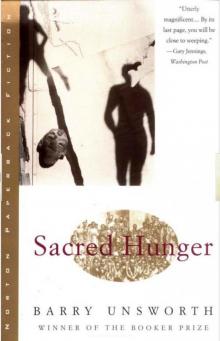 Sacred Hunger
Sacred Hunger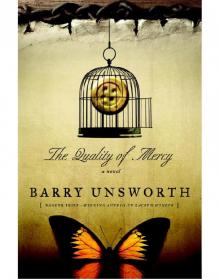 The Quality of Mercy: A Novel
The Quality of Mercy: A Novel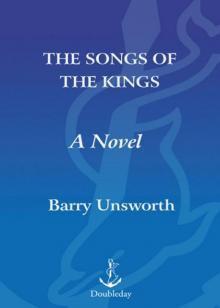 The Songs of the Kings: A Novel
The Songs of the Kings: A Novel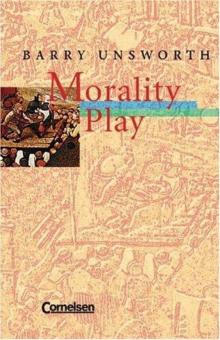 Morality Play. Mit Materialien. (Lernmaterialien)
Morality Play. Mit Materialien. (Lernmaterialien)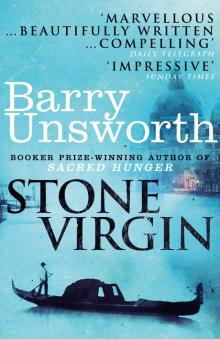 Stone Virgin
Stone Virgin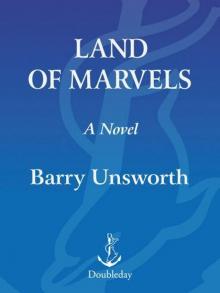 Land of Marvels
Land of Marvels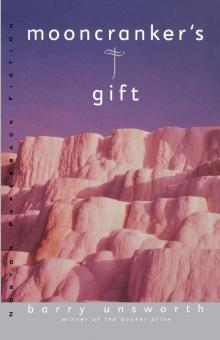 Mooncranker's Gift
Mooncranker's Gift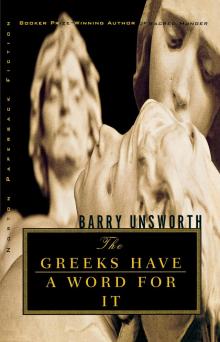 The Greeks Have a Word for It
The Greeks Have a Word for It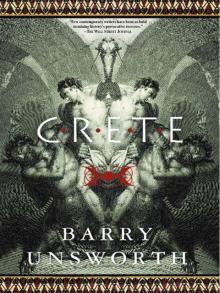 Crete
Crete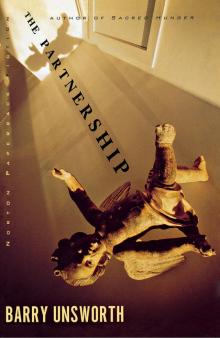 The Partnership
The Partnership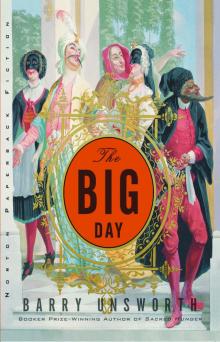 The Big Day
The Big Day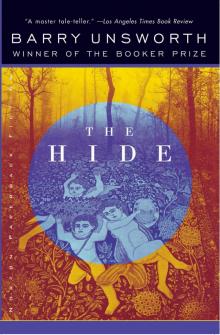 The Hide
The Hide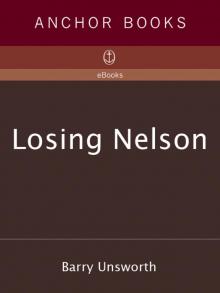 Losing Nelson
Losing Nelson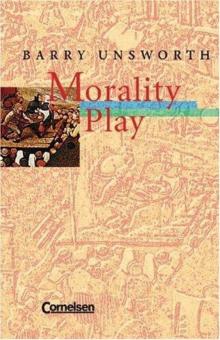 Morality Play
Morality Play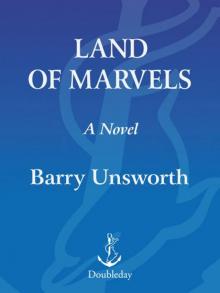 Land of Marvels: A Novel
Land of Marvels: A Novel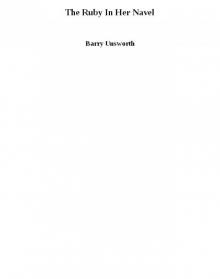 The Ruby In Her Navel
The Ruby In Her Navel